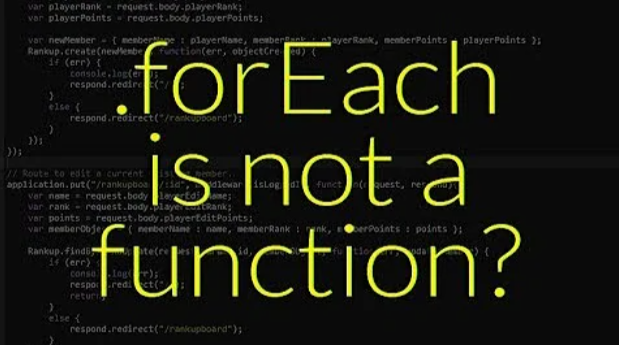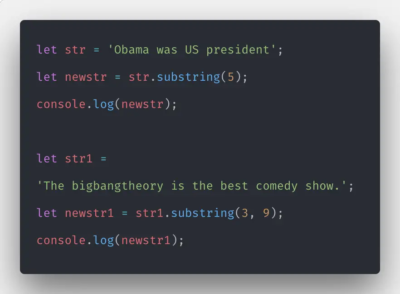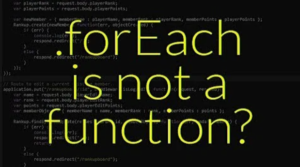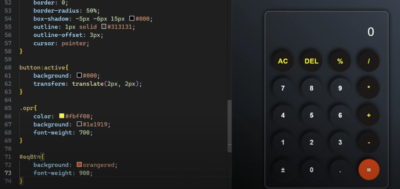
The JavaScript error “forEach is not a function” occurs when attempting to use the `forEach() `method on a variable or property that is not an array, `Set`, or` Map` object. Since JavaScript is dynamically typed, this error is common when developing JavaScript web applications. It may not be detected by your IDE until the application is run, such as when calling an array method on a string. To fix this error, locate the problematic line in your code and ensure that the `forEach` method is called on an array, `Map`, or `Set` object. When this error is thrown, whether you execute the application from the terminal or browser, you will receive a hint indicating the file and line where the error occurred.
Navigating JavaScript errors like “TypeError: forEach not a function” can enhance link-building strategies by ensuring clean, error-free code aids SEO efforts. Understand this resolution to boost your site’s performance and learn more about optimizing link-building KPIs for improved SEO rankings. Discover how at Key Performance Indicators for Link Building Agencies.
Here are two examples that illustrate how the “forEach is not a function” error can occur when attempting to use the forEach() function on a DOM element and an object:
// Calling array method on a DOM element will throw error
const boxes = document.getElementsByClassName(‘tableBox’);
console.log(boxes); // 👉️ [div.tableBox, div. tableBox, div. tableBox]
// ⛔️ Uncaught TypeError: boxes.forEach is not a function
// because boxes does not have a type of array
boxes.forEach(element => {
console.log(element);
});
// 👇️ Calling array method on an Objects
const newObject = {};
// ⛔️ Uncaught TypeError: newObject.forEach is not a function
newObject.forEach(element => {
console.log(element);
});
In the first example, the error occurred because the getElementsByClassName function returns an array-like object, not an actual array. Therefore, you cannot directly use JavaScript array methods and properties on it. The correct syntax to use the forEach method is Array.forEach, not arrayLikeObject.forEach. Calling `forEach` on an array-like object will result in an error.
In the dynamic landscape of web development, addressing TypeError issues like ‘forEach not a function’ in JavaScript can lead developers down a rabbit hole of troubleshooting. As we refine our JavaScript skills on platforms like log4javascript.org, it’s equally crucial to understand the security implications and authentication strategies in modern web applications.
In the second example, if you call forEach on an object that is not of type array, it will also cause an error. Objects do not implement the forEach method by default. Therefore, trying to use it on an object will result in the “forEach is not a function” error.
// Calling array method on a DOM element will throw error
const boxes = document.getElementsByClassName(‘tableBox’);
console.log(boxes); // 👉️ [div.tableBox, div.tableBox, div.tableBox]
// 👇️ convert it to an actual array with Array.from()
Array.from(boxes).forEach(element => {
console.log(element);
});
// 👇️ Calling array method on an Objects
const newObject = {name: ‘Justice’, country: ‘USA’};
Object.keys(newObject).forEach(key => {
console.log(key); // 👉️ “name”, “country”
console.log(newObject[key]); // 👉️ “Justice”, “USA”
});
In the first example, we utilized the `Array.from` method to convert the array-like object into an actual array. This conversion allowed us to safely call the forEach() array method without encountering any errors. It’s important to perform this type of conversion when dealing with different object types. If possible, convert the object to an array before utilizing any array methods or properties.
In the second example, we were missing the usage of `Object.keys()`. To iterate over an object, we need access to its keys. In the initial example, we were unable to iterate over the object because we didn’t have access to its keys. Therefore, we used the `Object.keys()` method to obtain an array of the object’s keys before applying the `forEach` method.
As programmers, it’s crucial to consider the type of variables we are working with and check them before usage to prevent future errors. For instance, when fetching an array of data from a remote server, we must verify its type. If the API owner decides to change the array data to an object, using it without checking the type will lead to errors in our application. In such cases, it is essential to check if the object is of array type before calling the `forEach` method. This proactive approach helps prevent potential errors in our code.
const data = null;
// Check first if it an array
if (Array.isArray(data)) {
data.forEach(element => {
console.log(element);
});
}
To determine if a variable is of type array, you can use the `Array.isArray()` method. It checks the variable’s type based on the value assigned to it. If the variable is indeed an array, you can safely call the `forEach` method. However, if you run the application and the “forEach is not a function” error persists, it indicates that the object you’re trying to call the `forEach()` method on is not an array.
In such cases, you can use `console.log()` to output the value of the variable and verify if it is an array before using it to call any JavaScript array methods like `Map`, `Set`, or `forEach`. By logging the variable value, you can inspect its type and ensure it matches your project requirements.
Exploring the Undefined Return and Non-Function Issue
forEach is indeed a function, but its availability depends on the object calling it. If the object is not iterable, the TypeScript compiler or JavaScript interpreter will throw an error stating “forEach is not a function.” To overcome this, you can convert the object into an array using methods like `Array.from()` or the spread operator …. Then, you can safely use forEach on the resulting array.
When working with HTML DOM elements, you may encounter the aforementioned error because DOM elements return a NodeList, which is not a direct iterable object.
const headings = document.getElementsByTagName(‘headings’);
// ⛔️ It will throw TypeError: headings.forEach is not a function
headings.forEach(element => {
console.log(element);
});
To resolve the mentioned issue, the first step is to convert the NodeList to an array or another iterable object. Once the conversion is done, you can then iterate through each element using a loop or any desired iteration method.
const headings = document.getElementsByTagName(‘headings’);
// Convert NodeList to an array object with Arrays.from()
Arrays.from(headings).forEach(element => {
console.log(element);
});
Conclusion
The JavaScript error “Uncaught TypeError: parent.children.forEach is not a function” occurs when you attempt to use the `forEach()` function on a variable, object, or value that is not of type ‘map’, ‘set’, or array. The only way to resolve this error is to ensure that you are calling the `forEach` method on an object that is of type array or map.
As a good programming practice, it is essential to think like a programmer and check the type of the object before calling the `forEach` method. This allows you to verify if the object is of array type, providing a safe and error-free execution of the forEach function.
By performing this type check, you can prevent the “Uncaught TypeError” error and ensure that you are applying the `forEach` method only on appropriate object types. This proactive approach promotes robust and reliable code execution.








